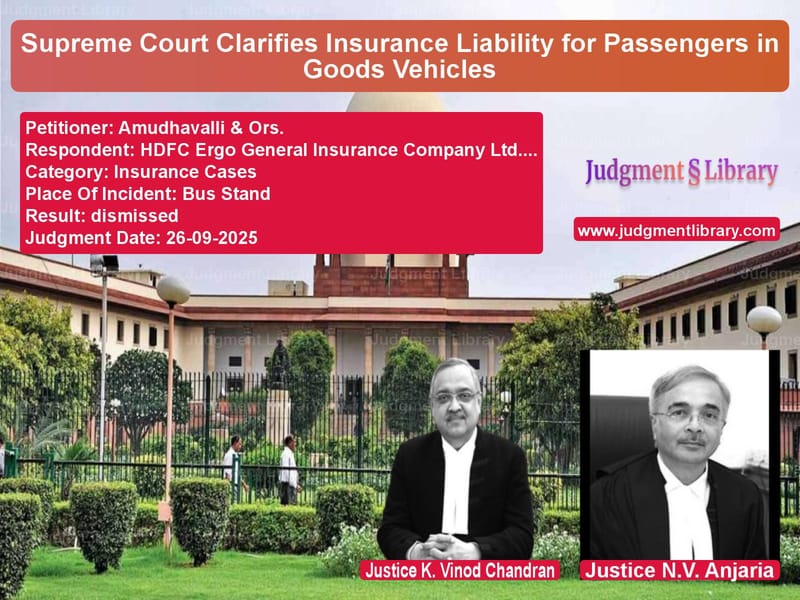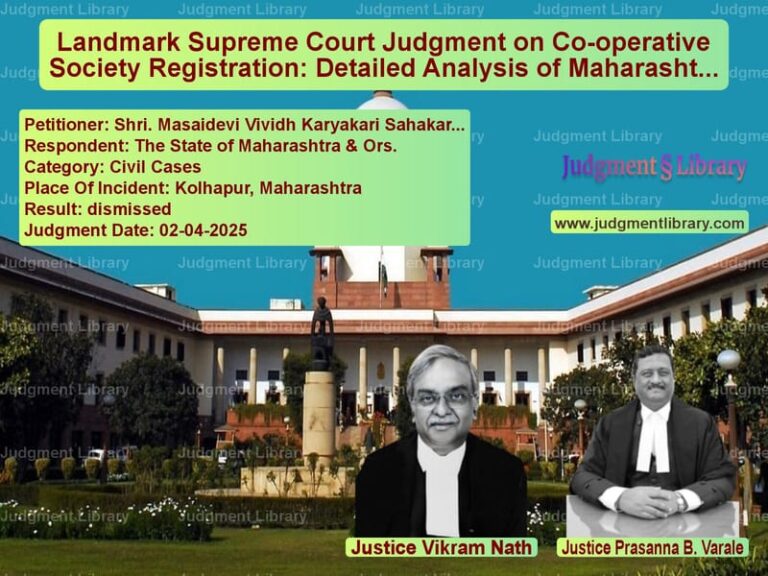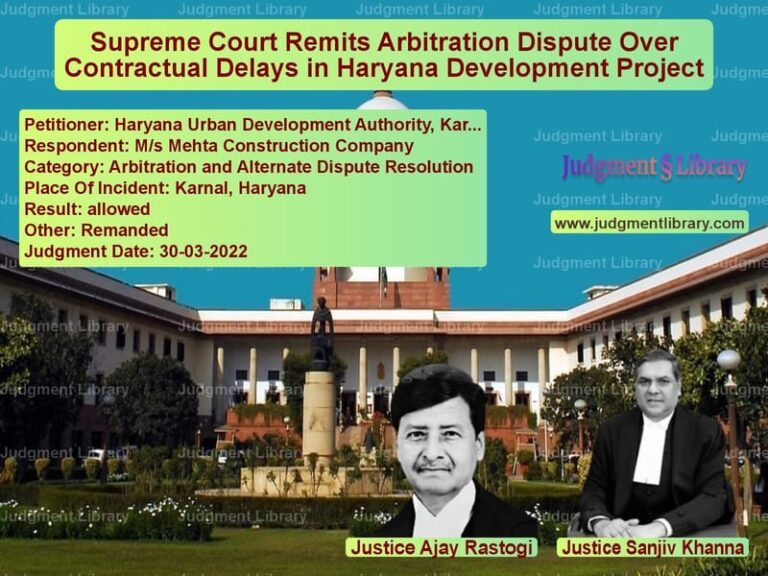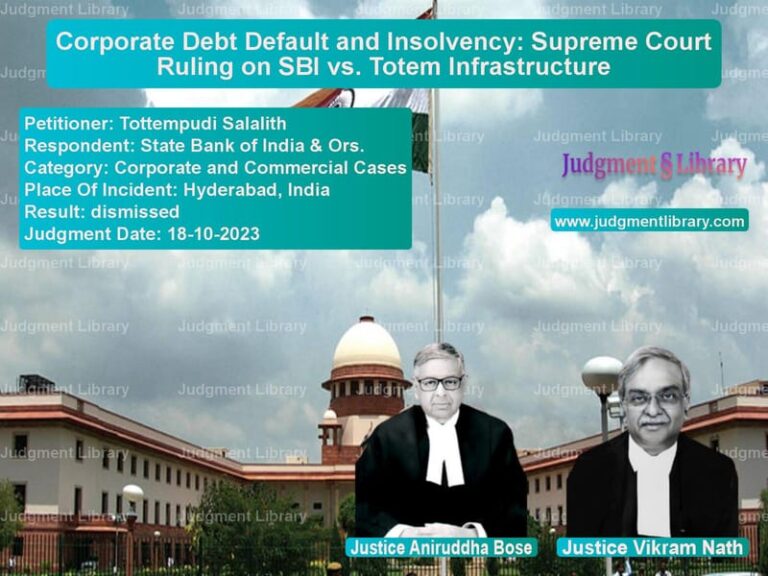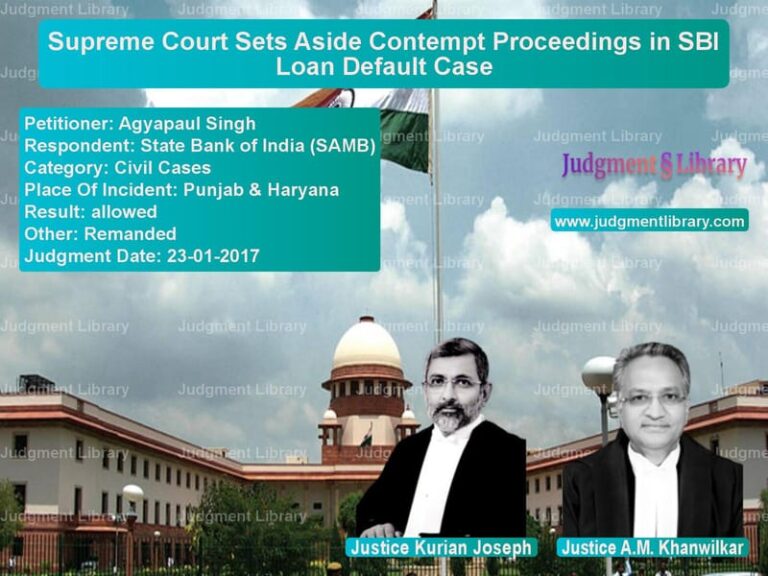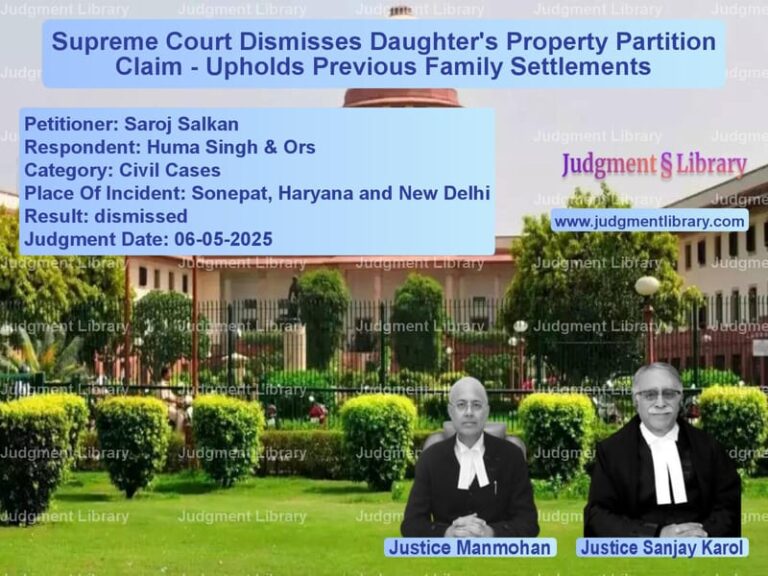Supreme Court Clarifies Insurance Liability for Passengers in Goods Vehicles
In a significant ruling that addresses a recurring issue in motor accident claims, the Supreme Court of India recently delivered a judgment that clarifies the liability of insurance companies when passengers travel in goods vehicles by paying fare. The case of Amudhavalli & Others versus HDFC Ergo General Insurance Company Ltd. & Others represents a crucial examination of the ‘pay and recover’ principle that courts often employ to balance the interests of accident victims with the contractual obligations of insurance companies. This legal dispute emerged from a tragic accident that claimed the life of a man traveling in a three-wheeler goods vehicle, raising fundamental questions about insurance coverage limitations and the extent of insurer liability in cases involving clear violations of policy conditions.
The case began when the Motor Accidents Claims Tribunal awarded compensation for the death of the first petitioner’s husband and imposed liability on the insurance company, despite the insurance company’s contention that the insured vehicle was a goods vehicle and the deceased was a traveling passenger who had paid fare. The Tribunal’s decision to brush aside the insurance company’s arguments set the stage for a legal battle that would eventually reach the Supreme Court. When the insurance company appealed to the High Court, the higher court confirmed the compensation quantum but set aside the ‘pay and recover’ direction that the Tribunal had issued, leading the claimants to approach the Supreme Court seeking restoration of the original order that would have ensured they received compensation from the insurance company, even if the company could later recover it from the vehicle owner.
The Competing Legal Arguments
Mr. Mohan Raj, the learned counsel for the petitioners, presented arguments focused on ensuring that the claimants received compensation without having to pursue the vehicle owner individually. He relied on two significant decisions of the Supreme Court to support his position. The first was Manager, National Insurance Company Ltd. v. Saju P. Paul and Anr., and the second was Shamanna and Another Vs. Divisional Manager, Oriental Insurance Company Limited and Others. These precedents established situations where courts had directed insurance companies to pay compensation amounts first and then recover them from vehicle owners, particularly in cases where technical breaches of policy conditions existed but the claimants needed immediate financial relief.
The petitioners’ counsel essentially argued for the application of the ‘pay and recover’ principle as a humanitarian measure to prevent hardship to the claimants, who had already suffered the tragic loss of their family member. This approach recognizes that while insurance companies may have valid contractual defenses against covering certain risks, accident victims should not be made to bear the burden of pursuing legally complex recovery actions against vehicle owners, who may not have the financial capacity to pay substantial compensation amounts.
On the opposing side, Mr. Joy Basu, the learned Senior Counsel appearing for the insurance company, presented a robust defense based on clear legal principles governing insurance contracts for goods vehicles. He pointed out that “the earlier view regarding a third-party coverage to a goods vehicle, including the gratuitous passengers has been reversed by this Court in New India Assurance Co. Ltd. v. Asha Rani.” This was a crucial argument because it highlighted a significant evolution in the legal understanding of insurance coverage for goods vehicles.
The insurance company’s counsel emphasized the factual admission that “in the present case, there is a clear admission that the deceased had travelled in a vehicle on payment of fare.” This factual foundation formed the basis of their argument that this case involved a fundamental breach of the insurance policy conditions, as goods vehicles are explicitly prohibited from carrying passengers for hire unless they are the owner of the goods or authorized representatives. The insurance company’s position was that they should not be held liable for risks they never agreed to cover and for which they never received premium payments.
The Supreme Court’s Analysis of Evidence and Legal Principles
The Supreme Court bench comprising Justice K. Vinod Chandran and Justice N.V. Anjaria conducted a thorough examination of the evidence and legal principles involved in the case. The Court first addressed the factual foundation, noting that “We cannot but observe that the witness of the claimants, PW-2, who was also an eye-witness stated unequivocally before the Tribunal that while the deceased and others were standing at the bus stand, the offending vehicle which was a three wheeler, came to the spot and the deceased and others travelled in it as passengers after paying fare.”
This clear evidence established the fundamental fact that the deceased was indeed a fare-paying passenger in a goods vehicle, which the Court recognized as a critical factor in determining insurance liability. The Court stated unequivocally that “The deposition clearly absolves the liability of the insurance company to indemnify the owner. The goods vehicle is not allowed to carry passengers, unless he is the owner of the goods carried therein or his authorised representative.” This finding reinforced the basic principle that insurance contracts are governed by their specific terms and conditions, and insurers cannot be forced to cover risks explicitly excluded from the policy.
The Court then turned to the central legal question: “Now the only issue is as to whether, the insurance company should be directed to pay the amounts and then recover it from the owner, which measure this Court adopted in various cases to avoid hardship to the claimants.” This framing of the issue acknowledged that while the insurance company might have a valid contractual defense, the Court had discretion to order interim relief to prevent hardship to victims.
Examination of Precedents on ‘Pay and Recover’
The Supreme Court engaged in a detailed analysis of the precedents cited by both parties, carefully distinguishing the factual and legal circumstances of each case. Regarding Saju P. Paul, the Court noted that “A reading of Saju P. Paul (supra) would indicate that therein the injured/claimant was travelling in a vehicle as a spare driver, as contended by the claimant himself. The claimant was stated to be the driver of another vehicle of the owner, and a spare driver was not covered under a third-party insurance policy which along with the third-party coverage included only the driver and cleaner of the vehicle.”
The Court examined the circumstances in which the ‘pay and recover’ principle had been applied in previous cases, noting that in National Insurance Co. Ltd. v. Bajjit Kaur and Others, “the Tribunal and the High Court proceeded in terms of the decisions of this Court in New India Assurance Company v. Satpal Singh and Others which was overruled in Asha Rani (supra). Since the Tribunal and the High Court had allowed the compensation based on Satpal Singh (supra), the measure of pay and recover was adopted in the said case.” This highlighted that the ‘pay and recover’ principle was often applied in transitional periods when legal interpretations were evolving.
The Court also considered National Insurance Co. Ltd. v. Challa Bharathamma & Ors., noting it as “yet another case in which ‘pay and recover’ was ordered. Therein the breach of condition of policy was projected insofar as the vehicle having not been covered by a permit to ply for hire or reward. The finding of the High Court as to the absence of permit not leading to violation of policy condition, was reversed by this Court. Therein also the measure of pay and recover was adopted.”
However, the Court found more relevant guidance in National Insurance Company Limited v. Kaushalaya Devi and Others, describing it as “a case in which an identical condition of gratuitous passenger being carried in a good carriage vehicle had resulted in the liability being mulcted on the owner and the insurer absolved of its liability to indemnify. Therein it was directed that the amount deposited by the insurer if withdrawn, it would be recovered from the owner and if not returned, it would be refunded to the insurance company, and the claimants would be entitled to proceed against the owner for recovery of the award amounts.”
The Court’s Final Ruling and Legal Reasoning
After thorough analysis of the facts and legal precedents, the Supreme Court arrived at its decisive conclusion. The Court characterized the situation as one involving “a fundamental breach noticed and the deceased claimant, being a person who travelled in the goods carriage after paying fare, the damages for his death was not entitled to be indemnified by the insurer.” This characterization was crucial because it distinguished this case from those involving technical or minor breaches of policy conditions.
The Court noted an important factual circumstance that influenced its decision: “There was no amount deposited or paid by the insurance company.” This factual context differentiated the case from situations where insurance companies had already made payments or deposits, which might have justified a ‘pay and recover’ approach to avoid unsettling completed transactions.
The Court also considered the timing of the High Court’s decision, noting that “it was passed before Satpal Singh’s case (supra) which stood overruled in Asha Rani (supra).” This temporal context was significant because it meant the High Court had decided the case based on the legal principles prevailing at that time, before the legal landscape shifted with the overruling of Satpal Singh.
Regarding the precedent in Shamanna, which the petitioners had relied upon, the Court distinguished it by noting that “Shamanna (supra) was a case in which the driver did not have a valid driving licence at the time of the accident in which the pay and recover direction was issued, relying on the decision in National Insurance Co. Ltd. v. Swaran Singh and Others.” This distinction was important because it highlighted that different types of policy breaches might warrant different judicial responses, with some technical breaches potentially justifying ‘pay and recover’ while fundamental breaches might not.
Based on this comprehensive analysis, the Supreme Court concluded that “In the above circumstances, we find absolutely no reason to interfere with the order of the High Court,” and accordingly dismissed the Special Leave Petition. This ruling reinforces the principle that insurance contracts must be interpreted according to their terms, and that courts should be cautious about extending coverage to risks explicitly excluded from insurance policies, even when doing so might create hardship for accident victims. The judgment provides important clarity on the limits of the ‘pay and recover’ principle and establishes that fundamental breaches of insurance policy conditions, particularly those involving illegal carriage of passengers in goods vehicles, may not justify imposing immediate payment obligations on insurance companies.
Petitioner Name: Amudhavalli & Ors..Respondent Name: HDFC Ergo General Insurance Company Ltd. & Ors..Judgment By: Justice K. Vinod Chandran, Justice N.V. Anjaria.Place Of Incident: Bus Stand.Judgment Date: 26-09-2025.Result: dismissed.
Don’t miss out on the full details! Download the complete judgment in PDF format below and gain valuable insights instantly!
Download Judgment: amudhavalli-&-ors.-vs-hdfc-ergo-general-in-supreme-court-of-india-judgment-dated-26-09-2025.pdf
Directly Download Judgment: Directly download this Judgment
See all petitions in Motor Insurance Settlements
See all petitions in Third-Party Insurance
See all petitions in Insurance Settlements
See all petitions in Commercial Insurance Disputes
See all petitions in Other Insurance Cases
See all petitions in Judgment by K. Vinod Chandran
See all petitions in Judgment by N.V. Anjaria
See all petitions in dismissed
See all petitions in supreme court of India judgments September 2025
See all petitions in 2025 judgments
See all posts in Insurance Cases Category
See all allowed petitions in Insurance Cases Category
See all Dismissed petitions in Insurance Cases Category
See all partially allowed petitions in Insurance Cases Category

